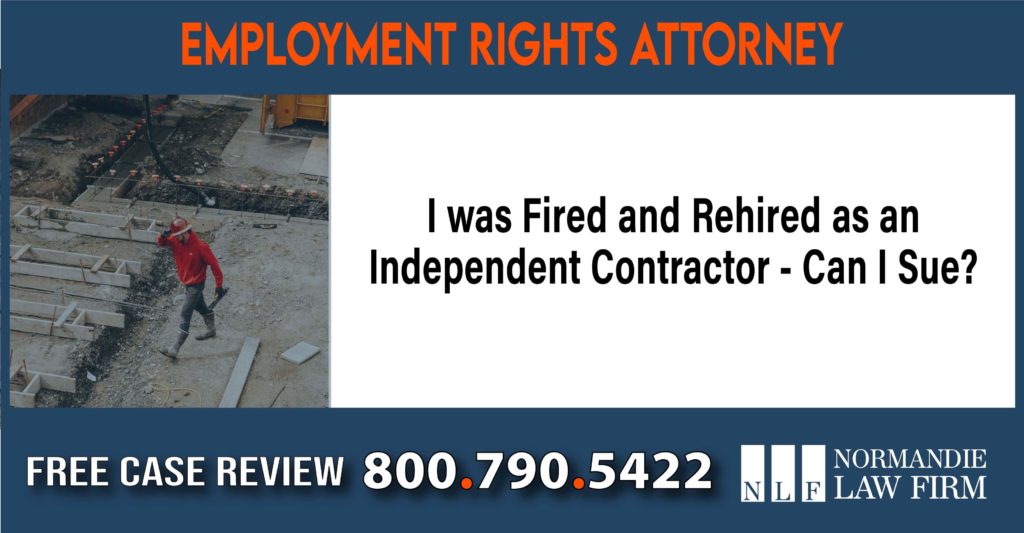Were you laid off, fired, or demoted from your job and then rehired as an independent contractor? This is a huge loss to anyone that was classified as an employee, which means you are entitled to overtime pay, paid time off, and other valuable benefits. Unfortunately, it’s become very common for workers to be let go with the promise of being rehired later on. But once they return to work, they are shocked to find out that they have been classified as an independent contractor.
At this point, you are upset and confused, and it’s more than likely that you have found yourself asking:
What are my rights if my employer called me back to work, but they classified me as an independent contractor?
In this article, we will go over the rights you have as a misclassified worker under California law and federal law, including the right to sue your workplace for misclassification. Please note that this is general information that will not address various issues that are specific to your own situation. To learn more about your rights and legal options, call the California labor law attorneys of Normandie Law Firm.

Our Recent Verdicts and Settlements
$2.5 Million
$1.1 Million
$1.5 Million
$600,000
$525,000
$734,851
Employer versus Independent Contractor: Why Does it Matter?
It may seem like having a job and getting paid are what matters at the end of the day, but your employment status is critical for a number of reasons, which we will go over in this section. Traditionally, an independent contractor is defined as someone that:
- Performs a service in exchange for a specified payment amount
- Retains control over how and when the service is performed.
This is why a lot of at-home workers are classified as independent contractors if they decide their own hours and other terms for how they accomplish their work duties. However, there are many workers that see clients in person, visit work sites, and perform other tasks that are associated with traditional employment. The difference is that they are in control of how the task is accomplished; they also pay their own taxes instead of having an employer deduct it from their paycheck.
The opposite of an independent contractor is an employee, and California has a system known as the ABC test in order to determine an employee-employer relationship. Such a relationship is established when:
- The work is done according to the company’s control or direction
- The work is within the company’s usual course of business
- The worker does not provide their services as an independent business / sole proprietor
This is not the only test that may be used to figure out whether you are an independent contractor or an employee. Due to the evolving nature of employment and how work is performed within certain professions, the Borello standard may be used, although the ABC test does apply in most cases. This is a complex subject that merits further discussion, so please reach out to an employment rights lawyer at our office.
Federal Employment Laws on Independent Contractors
The federal laws regarding classification of workers are different based on the Fair Labor Standards Act, or the FLSA. Instead of a single test, your classification as an independent contractor versus an employee is based on many different factors, such as:
- The permanency of the relationship between the worker and employer
- How integral are the employee’s services to the employer’s business?
- What is the degree of control over the work by the employer?
- The degree of independence exercised by the alleged contractor
- The contractor’s potential profits and losses
- The amount of judgment, foresight, and initiative with others in open market competition for the alleged independent contractor to be successful.
We are happy to go over these standards with you during a free case review and help you decide on the best way to move forward if you are entitled to compensation as a wrongly classified employee.
Can I Sue if I was Misclassified as an Independent Contractor?
If you were wrongly classified as an independent contractor, there are laws that provide you with powerful protections, including the right to file an employee misclassification lawsuit.
Sadly, many employers misclassify employees in order to take advantage of them, like not giving them rest breaks and overtime pay. They may also force or pressure you to work outside of your normal job hours (working off the clock). Compensation for a misclassified worker includes various payments, like overtime pay plus interest and one hour’s pay for each meal break they did not receive.
Monetary damages may come from a third party, meaning individuals or companies other than your employer. One example has to do with truck drivers that are misclassified by a trucking / delivery company. If it’s found that drivers have been misclassified, the company’s name will be added to a website (List of Port Trucking Companies with Outstanding Judgments) that warns potential customers – typically, big box stores and supermarkets. These places can be sued by a misclassified driver if they continue to hire a company that’s on the list.
I Signed a Contract that Says I’m an Independent Contractor – Can I Sue?
Many people that come to us for advice admit that they signed an independent contractor agreement, which says they are not an employee, i.e., someone protected by certain laws that apply to California employees, such as workers’ compensation and minimum wage laws.
Even if you signed a contract, your classification as an employee or independent contractor is based on the nature of your working relationship with your employer. In essence, the court will not assume that you are an independent contractor just because you signed a written agreement saying that you are. What they are looking for is the state of your relationship with your employer, and whether it meets the standards of an employee-employer relationship according to the ABC test or the Borello standard.
Therefore, you may have the right to file a misclassification as an independent contractor lawsuit, no matter the contract that exists between you and the person / company that hired you.
Help – I Got Fired for Reporting Misclassification by my Employer!
Employers in California are prohibited from retaliating against an employee for reporting workplace violations to the California Labor Department. It is also illegal to demote, fire, or suspend an employee for seeking legal advice if they believe they have been misclassified as an independent contractor.
Retaliation is a form of punishment by an employer against an employee for exercising their rights under California’s labor laws. The majority of retaliation cases we handle involve wrongful termination, meaning that the worker was unjustly fired. Aside from wrongful termination, employers may retaliate against an employee by cutting their hours or pay, denying them a promotion, or demoting them from their current position.
What is the Average Value of a Misclassified Employee Lawsuit?
The amount you can receive from a misclassification by an employer lawsuit can range from $5,000 to over $200,000. On average, cases at our law firm are settled for around $15,000 to $100,000, though the actual amount will vary significantly from one client to another. This is due to the fact that case values are based on the following damages:
- Minimum wage violations
- Meal / rest break violations
- Overtime violations
- Willful misclassification of an employee
- Interest on unpaid amounts owed by the employer
- Legal fees (cost of hiring an attorney)
Intentional misconduct is an important concept when it comes to these lawsuits. For example, some cases of misclassifying as an independent contractor are “good faith” errors, meaning there was no intent to cheat the worker out of the benefits they would have received as an employee. On the other hand, there are cases of “willful misclassification,” where an employer intentionally classified an employee as an independent contractor to deny them benefits and protections under California law. If you were intentionally misclassified by your employer, you may receive additional damages on top of your regular settlement award.
Please note that the amount of compensation for each of the categories listed below is based on specific formulas according to federal and California laws. That’s why you must speak with an experienced employee classification lawyer if you would like to find out how much your lawsuit is worth.
How Long Do these Cases Take to Settle?
Some employment lawsuits are settled within a matter of weeks, but others take 2 or more years of litigation. Many factors affect the amount of time to settle a case, including the violation you are suing over, the evidence to support your case, and the type of company / employer you are suing. Our goal is to work out a settlement directly with your employer, hopefully within a few months. But there are cases with highly complicated issues, and some companies will fight very hard to deny charges of misclassification. It’s possible that these lawsuits will go to trial, but we would say that less than 5% of these cases are tried in court.
We can provide you with a better estimate of how long it may take to settle your labor law violation claim during a free consultation, so please contact our law firm.
What is the Deadline to Sue for being Classified as an Independent Contractor?
The statute of limitations for a workplace violation case depends on the type of lawsuit you are filing. If your lawsuit is based on wages and hours violations, then you will need to file a lawsuit within 3 years from when the violation occurred or from the date of the most recent violation. However, if your claim is based on a breach of contract, meaning your misclassification is against a written contract between you and your employer, you must file a lawsuit within 4 years of the violation.
One of our attorneys can help you determine the correct deadline for a misclassified employee lawsuit; just give us a call at your earliest convenience.
Talk to an Employment Rights Lawsuit Attorney
If you have questions about filing a proper classification of employee lawsuit against your employer, don’t hesitate to give us a call. We are here for you 7 days a week, 24 hours a day, and we are more than ready to provide you with advice and guidance.
If suing your employer is the best course of action, we will not charge you a single penny upfront, since we work strictly on contingency. Our law firm also has a policy known as the Zero Fee Guarantee, where clients pay $0 in the event we do not recover their settlement from a workplace violation lawsuit. In other words, the only way we get paid is if you get paid.
Contact Normandie Law Firm today and schedule a free case evaluation with a lawyer who can help you sue your employer for classifying you as an independent contractor.













